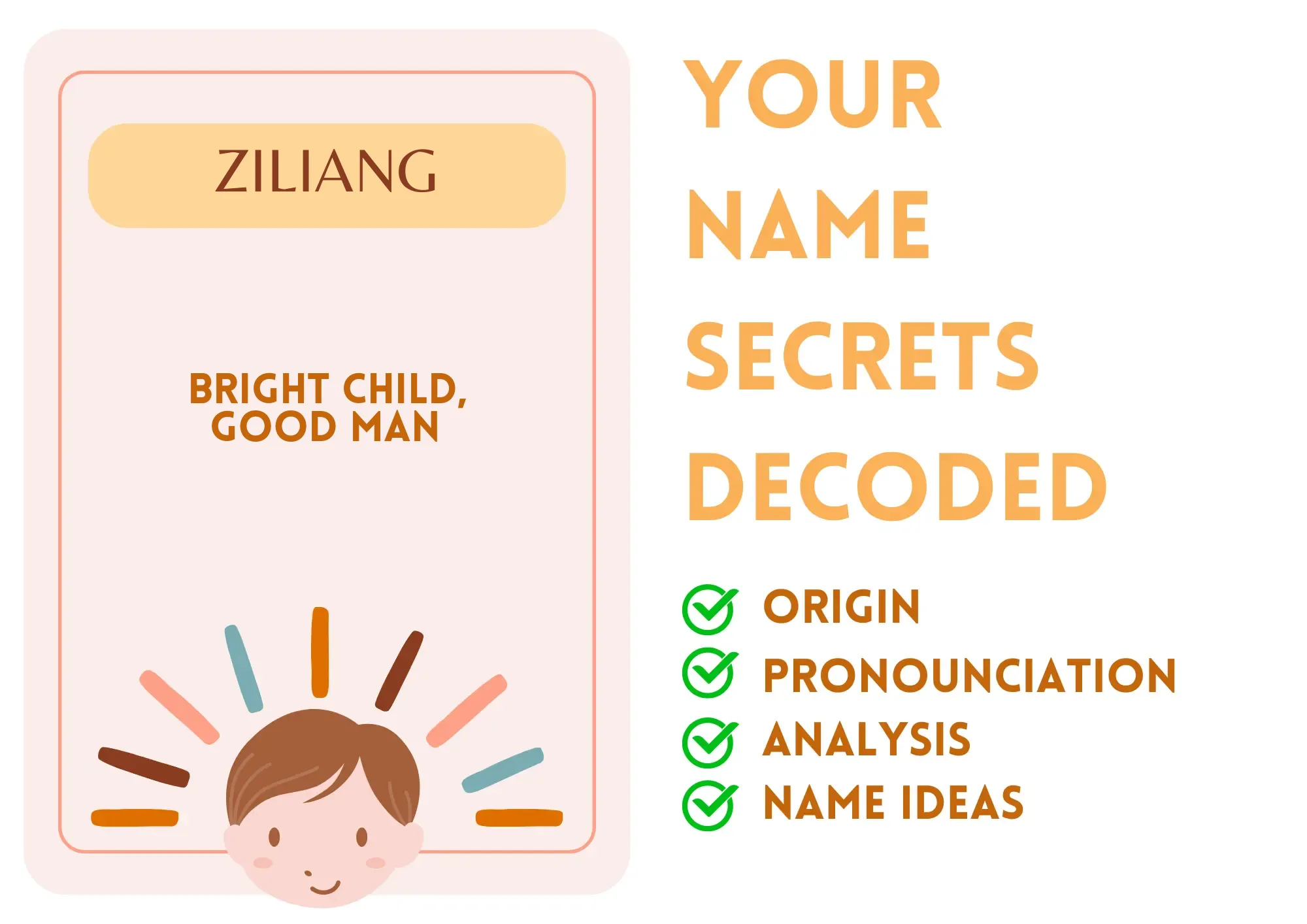
Ziliang
Ziliang is a name of Chinese origin that combines two elements: 'Zi,' meaning 'child' or 'son,' and 'Liang,' meaning 'bright' or 'a good man.' It carries the connotation of a 'bright child' or 'son.' The name is most commonly used in Chinese-speaking communities and can be given to both boys and girls, though it is predominantly masculine.
In Chinese culture, names are often chosen based on their meanings and how they sound, conveying hopes for the child's future. Ziliang aligns with traditional values emphasizing brightness, positivity, and good character.
Ziliang is generally embraced positively, reflecting aspirations of intelligence and distinction. It is relatively simple to write and pronounce, with common nicknames like Zi and Liang.
While not widely known in global popular culture, the name's components are often used in literature and cultural references around virtues and positive attributes. Overall, Ziliang is appreciated for its meaningful significance and cultural depth.
Basic Information
Gender: Boy
Sounds Like: zee-lee-ang
Pronunciation Explanation: The name starts with a 'zee' sound, followed by 'lee', and ends with 'ang' which rhymes with 'song'.
Summary and Meaning
Meaning: bright child, good man
Origin: The name Ziliang originates from China, particularly within the context of Chinese language and culture.
Usage: Ziliang is traditionally used as a masculine name, but it can also be unisex depending on the context.
Name Number (Chaldean)
Name Number (Pythagorean)
Popularity (Global Rank)
Overall: 107722
Boys: 72681
Most Popular in
Religious and Cultural Significance
Religion: Buddhism
Background: In Chinese culture, many names, including Ziliang, are influenced by Buddhist principles and values, promoting positivity and good deeds.
Cultural Significance: Ziliang embodies cultural values of brightness and virtue, making it a favored choice among parents aspiring for the best qualities in their children.
Historical Significance: Names like Ziliang can be found in historical texts and stories within Chinese literature, symbolizing noble qualities and aspirations for success.
Popular Culture
Literature and Mythology: In Chinese folklore, names reflecting virtues, such as Ziliang, are often used for characters representing wisdom and moral integrity.
Movies and Television: Though not prevalent in mainstream movies, variations of Ziliang or characters with similar themes appear in various Chinese films, embodying intelligence and bright characteristics.
Feelings and Perceptions
Perception: Ziliang is generally viewed positively. It evokes feelings of hope, brightness, and character, reflecting parents' aspirations for their children.
Positive Feelings: Unique, radiant, hopeful, virtuous, distinguished.
Negative Feelings: May be challenging for non-Chinese speakers to pronounce, and could be seen as unfamiliar.
Practical Considerations
Ease of Writing and Calling: Ziliang is moderately easy to write and pronounce. It consists of three syllables, which may require practice for those unfamiliar with Chinese phonetics.
Common Typos and Misspellings: Ziliang,Zilyang,Zillang,Zillaang
Common Nicknames: Zi,Liang,Zee
Ziliang Popularity
Ziliang Usage and Popularity By Country
| Country | Rank (Overall) |
|---|---|
| Japan | 16713 |
| Chile | 34158 |
| Switzerland | 35738 |
| Australia | 36837 |
| United States | 37381 |
| Germany | 38475 |
| Canada | 42397 |
| Singapore | 53638 |
| Malaysia | 55545 |
| Spain | 63520 |
Ziliang Usage and Popularity By City
| City | Rank (Overall) |
|---|---|
| Peking | 2309 |
| Shanghai | 3166 |
| Seattle | 9031 |
| New York | 32506 |
| Los Angeles | 24616 |
| Taiyuan | 152 |
| Brooklyn | 11278 |
| Sydney | 24786 |
| Austin | 11840 |
| Atlanta | 23447 |
Compatibility Analysis
Famous Persons Named Ziliang
No results found for Ziliang.
Related Names
Similar Sounding Names:
Zeren,Zijian,Zhen,Ziling